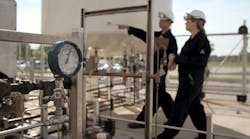(a.k.a. “Pump Guy”)
From: John D.
Sent: Monday, July 10, 2008 1:50 PM
To: [email protected]
Subject: Replacement Parts
Attn. Mr. Pump Guy,
For over 20 years, I have been the maintenance shop engineer at a Chicago-area chemical plant. I always read Flow Control magazine and collect all of your articles. I appreciate what you do for the pump-user community. I need your help.
A small, obscure pump manufacturer supplied many of our original pumps when our plant was built. Now that company has gone off shore, and we need to replace many parts.
The "suits" say there are no funds to purchase new pumps. We really need impellers, volutes, wear rings and other parts.
One sales rep offers pirated knock-off parts. Another sales rep says he can reverse-engineer and recreate our degenerated parts. Another salesperson says the original pump company still exists in China, and he offers to import our parts. Can you offer any advice?
Cordially,
John D.
- "I attended your seminar this week in Chicago, and it’s already paying for
itself. Your seminar taught me about concentric reducers on suction lines and horizontal elbows on split case pumps, which will be quite helpful on several plant system designs I’m currently working on." - "Just a brief note to say ‘thank you’ with regards to the Pump Guy Seminar. I thought the seminar was very informative and entertaining as well. I wish to thank you for all of your efforts with the seminar on behalf of the attendees. A good job well done!”
- "The course was everything I expected. I needed this information 30 years ago, but it’s never too late."
- "This course holds tremendous value for anyone involved in the design, operation, maintenance, or purchasing of pump systems."
- "The information I’ve learned from this seminar will most definitely help my understanding of pump issues at work."
- "For my line of work, this seminar was dead on. It met my needs fully. Best money my company has ever spent for a training course."
- "The monetary price for your shared knowledge and ability to bring pump design back to the basics was worth every penny. Thank you for making your seminar attendees look good with our colleagues."
FOR MORE INFORMATION & TO REGISTER FOR THE PUMP GUY SEMINAR, CLICK HERE.
KEY SEMINAR TOPICS INCLUDE:
• Basic Pump Principles
• NPSH
• Cavitation
• The Affinity Laws
• Work & Efficiency
• Pump Classification
• Pump Curves
• System Curves
• Shaft Deflection
• Pump-Motor Alignment
• Bearings
• Pump Packing
• Mechanical Seals
• Pump Piping
FOR MORE INFORMATION & TO REGISTER FOR THE PUMP GUY SEMINAR, CLICK HERE.
If you have any questions about the PUMP GUY SEMINAR or need help registering, please contact Matt Migliore at 610.828.1711 or [email protected].



